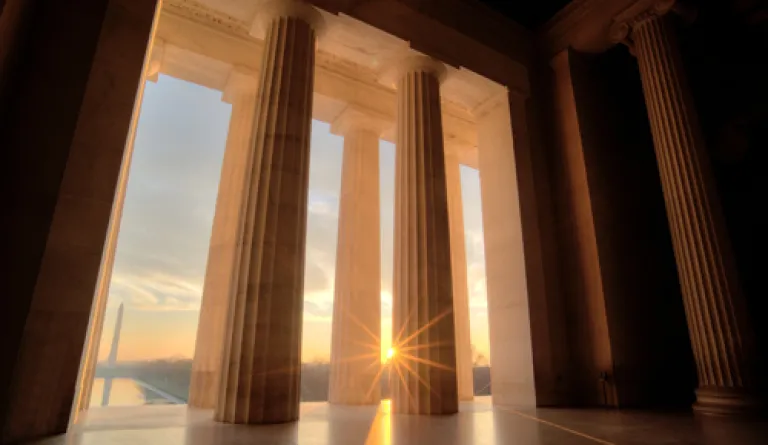When the Rule of Law Is Under Attack, We Must Stand Together

In these extraordinary times, we ground ourselves in the foundational principles of our justice system, and we recommit to advancing them. At IAALS, our work is built on these principles, and every day we strive to ensure that the justice system lives up to its promise of being fair, accessible, and accountable to all.
But today, that promise is under siege. We face unprecedented attacks on the judiciary, attacks that aren’t just political, but fundamental. They question whether our justice system can truly deliver on its ideals. And they come at a time when public trust in that system is already deeply strained.
To be clear, these are not partisan issues. They are issues of democracy, trust, and accountability. Judges must be allowed to operate in a fair and impartial way, insulated from political pressures and threats, answering only to the rule of law.
Our Constitution established three co-equal branches of government and deliberately separated the judiciary to safeguard its independence. Indeed, courts have a constitutionally mandated duty to measure the acts of the other branches against the law. While upholding the Constitution, they are charged with ensuring that all people—from private citizens to government officials—receive the full protections of the law. As Justice Anthony Kennedy so well-articulated, “Judicial independence is not conferred so judges can do as they please. Judicial independence is conferred so judges can do as they must.”
Yet today, we see growing efforts to undermine that independence. Accusations of political bias, threats of impeachment, and disinformation campaigns designed to erode public confidence are not just irresponsible, they are dangerous. They fuel intimidation and violence, and they strike at the heart of the rule of law. As Chief Justice John Roberts recently warned, “These tragic events highlight the vulnerability of judges who sign their names to the decisions they render each day and return home each night to communities, where they remain involved as neighbors, volunteers, and concerned citizens.” Despite these attacks and the risks and real violence that result, we have continued to see judges and courts uphold the rule of law. But they cannot stand alone. Now more than ever, we must act. Because what’s at stake is nothing less than the integrity of our justice system.
As guardians of the rule of law, lawyers play a vital role in this system. They take an oath to support the Constitution, to respect the courts, and to advance the administration of justice for the betterment of society. In our adversarial system, justice depends on both sides being represented. It depends on attorneys having the freedom to advocate, even for the unpopular or misunderstood. Yet today, we see lawyers and law firms attacked simply for who or what they represent. These attacks strike at the core of our legal system. Just as judges must be free to rule based on the law, attorneys must be free to defend their clients without fear of retaliation. We cannot allow fear or political pressure to chill that responsibility. The rule of law depends on their courage—and on our collective resolve to defend it.
But there is strength in solidarity. Across the country, lawyers, law firms, and professional associations have stepped up to defend judges, fellow attorneys, and the impartial administration of justice. As one joint statement so powerfully put it, “The law does not protect itself; it survives because those sworn to uphold it have the courage to do so.” In a time when division can feel overwhelming, collaboration is not just powerful, it is essential. We at IAALS applaud this courage, and we amplify some of those voices here.
- American Association for Justice (AAJ)
- American Bar Association (ABA)
- American Board of Trial Advocates (ABOTA)
- American College of Trial Lawyers (ACTL)
- Federal Bar Association
- Hispanic National Bar Association (HNBA)
- International Academy of Trial Lawyers (IATL)
- Joint Statement of Bar Associations
- National Bar Association
- National Asian Pacific American Bar Association (NAPABA)
Still, we must acknowledge a deeper truth. These attacks find traction because too many people already feel left behind by the system. For millions, the justice system feels distant, unresponsive, and inaccessible. Data shows that 66% of the population has experienced at least one legal issue in the past four years, but that only 49% of those problems have been completely resolved. The disconnect between the ideal of justice and the reality people experience leaves space for distrust, making it that much easier for bad actors to undermine the rule of law.
I recently shared with someone that I’ve been deeply troubled by the escalating attacks on judges, lawyers, and the rule of law—foundations that have shaped my identity, both as a lawyer and now as CEO of IAALS. These principles aren’t abstract to me, they are personal. And what we’re witnessing today feels unlike anything I’ve seen in my lifetime. Their reply was simple and striking: “Well, I’ve been struggling for years.”
That response stayed with me. It revealed the real crisis we face, a crisis of belief. If people don’t believe the system works for them, how can they be expected to defend it?
This is our challenge and our charge. It is not enough to defend the ideals. We must build a justice system that lives up to them.
Since its founding nearly 20 years ago, IAALS has worked to protect the core principles of justice while also pushing for bold, inclusive, research-driven reform. We believe deeply in the rule of law, but we also believe it must evolve to meet the needs of our time. We are working to create a more equitable and accessible system, to modernize how judges are selected and evaluated, and to reimagine legal pathways for people navigating the system without representation. New innovations that fortify the justice system’s foundations and uphold its promise of justice for all. These are not partisan goals. They are the building blocks of a more fair and functional democracy.
On Constitution Day, I called on judges, lawyers, law schools, and partners to join us in this work. At the time, I could not have known just how urgent that call would become. Today, our collective action is needed not only to defend the rule of law, but to improve our justice system, make it work for people on the ground who are struggling, and rebuild the trust that sustains it.
As a nonpartisan organization, IAALS doesn’t wade into politics. But we do speak with urgency about the need to protect the systems that uphold justice.
And we’re not alone. Across the country, people are stepping up to defend and improve the systems that hold our democracy together. There is real momentum and real hope. This is our shared responsibility, and it is also our shared opportunity. Together, we can build a justice system that truly delivers on its promise of justice for all.
